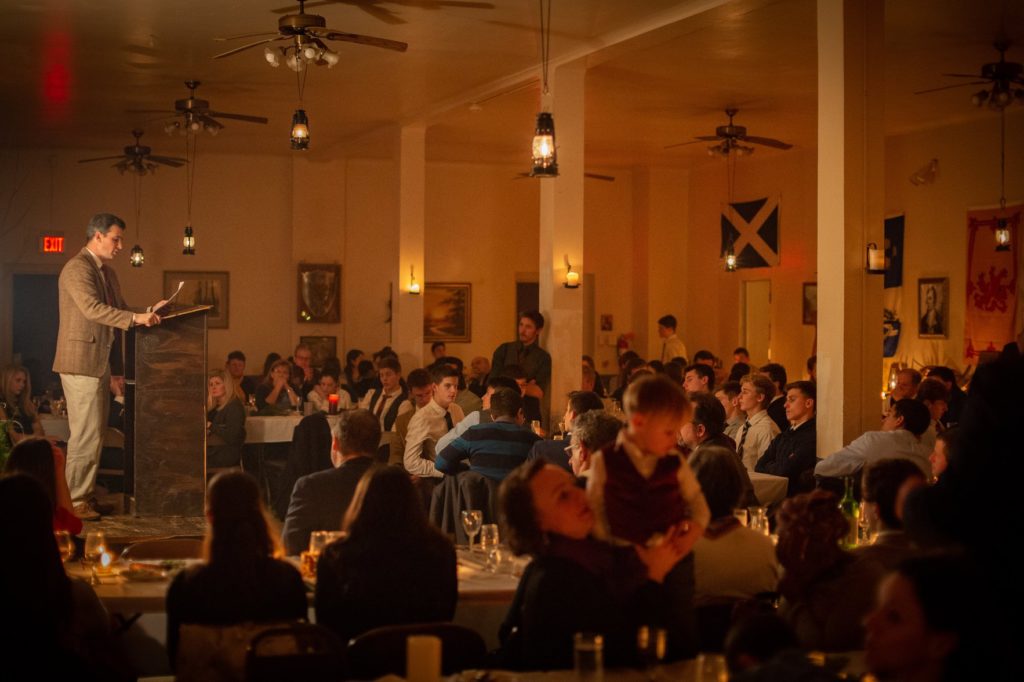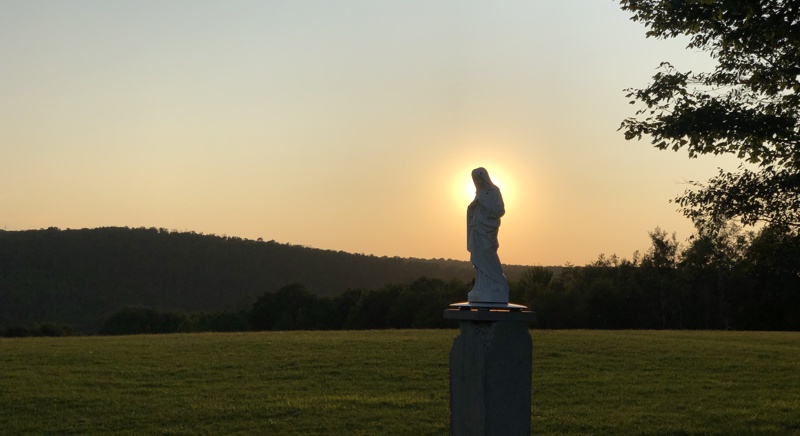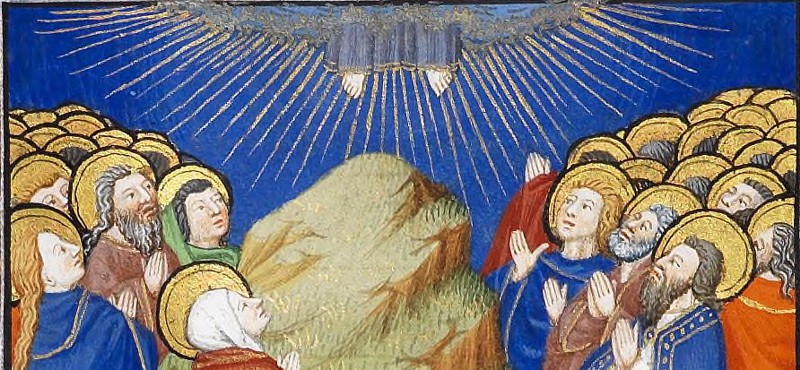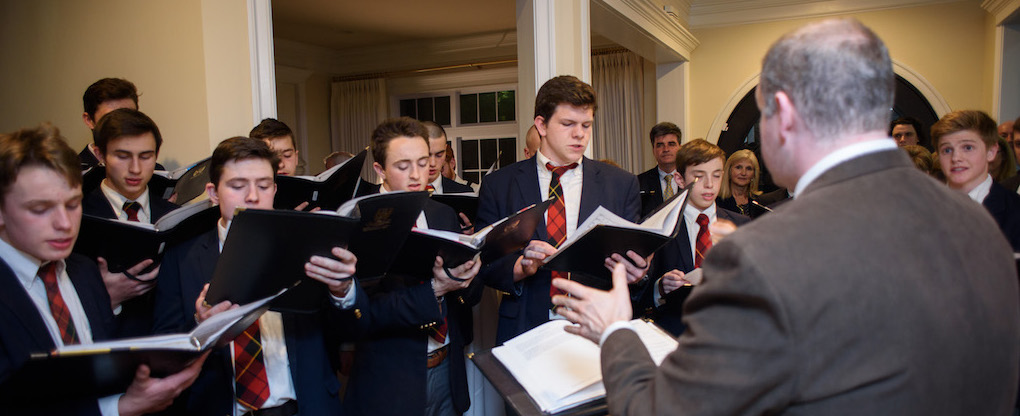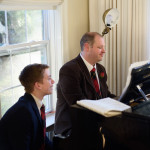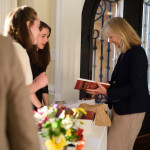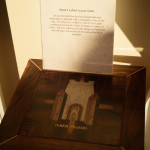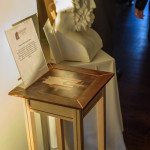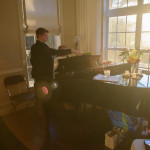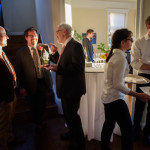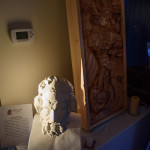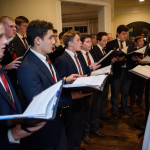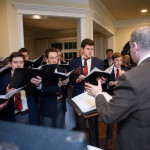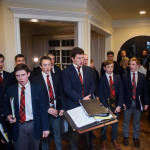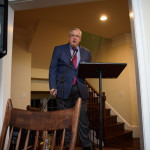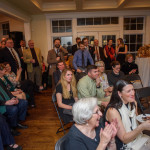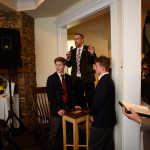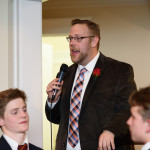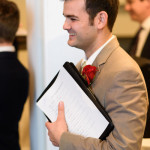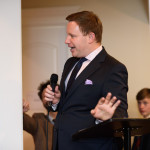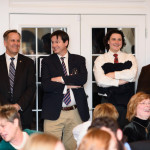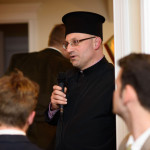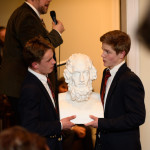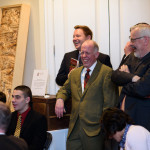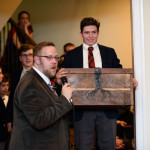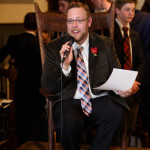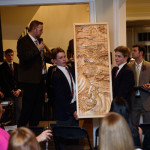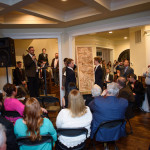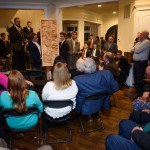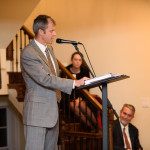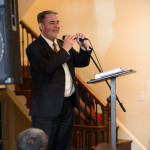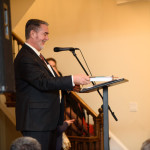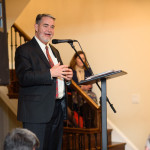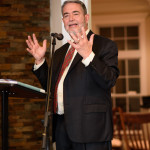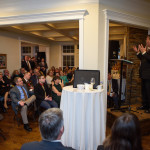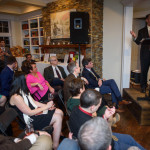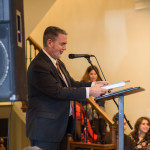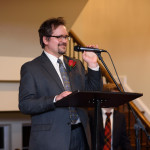Address given at the Robbie Burns Supper
Gregory the Great Academy, 2020
by Dr. John McCarthy
The ancient poets often employ the theme of νόστος: homecoming. I came to Saint Gregory’s in the winter of 2006 in the middle of the year. John Burger picked me up from the airport. There was a snow. I didn’t know anyone here, nor did I really know anyone who had come here. I was wearing my letterman from my old high school. I had long hair, not the kind of 90’s grunge band hair you sometimes our young alumni wear, but more like That 70’s Show, except I would try to frill it out. It seemed a good style at the time, and in justice, it was fairly reflective of my character.
As I said, when I got here it was storming, and there were only few boys on campus, and we had some free time. So Michael McGrath, more commonly known as Griz, led us on an expedition where we spent twenty-five minutes trudging through the snow, fifteen minutes repairing a dilapidated fort, barely got a fire going that was not enough to give more than your hands a few seconds of the feeling of warmth, had some nasty cowboy coffee, and trudged through the snow home. They thought it was a great time. I thought there must be something wrong with them.
Growing up in the New Mexico desert, I was cold almost all the time. I thought I would start varsity rugby for sure. I had never played rugby before, but I considered myself tough, and I had played a couple varsity sports at my old high school. I thought I would have a fairly easy time making varsity rugby. I had heard I had to be able to tackle if I wanted to play on A-side, so I thought I would give it a go in one my first practices. Back then, our strategy wasn’t as sophisticated as your boys’ is now. We would just find clever ways to get the ball to Steve Taylor, who did the team’s best impression of Achilles, and we won a lot of games that way. Well in one of my first practices, I tried to tackle Steve, and he give me a stiff arm in the nose. I could hear the cartilage in my nose cracking. I thought if I told Mr. van Beek, it might be an excuse to get out of the rest of practice. It wasn’t.
I missed home. Although I initially was not particularly fond of any of the activities that went on here, I could not help but like the other boys. They were so different than my friends at home. Our conversations were different. They cared about their own excellence, they cared about honor, and duty, legacy, and what was beautiful. So, I stuck it out. It was an adventure, it was a challenge, and it was in a way an awakening.
In my first folk music class, we stood over in that corner and Brendan Landell taught us “A Man’s a Man.” Whenever I hear that song now, all those feelings from that winter come and wash over me like a great wave. I can almost smell the refectory. In some sense, I have my nostos. I feel, if only for a fleeting moment, at home.
When I was reflecting on how I would give this toast, I came across something that quite surprised me. Abraham Lincoln gave an immortal memory toast. I read that Lincoln said,
If it were not for Robert Burns, I would not have won the war… Burns never touched sentiment without carrying it to its ultimate expression and leaving nothing further to be said… I cannot frame a toast to Burns. I can say nothing worthy of his generous heart and transcending genius. Thinking of what he has said, I cannot say anything which seems worth saying.
Our greatest statesman attributes his greatest success to reading a playful poet. There is an old quarrel between the philosophers and poets. The philosopher refers to the poet as that “yelping bitch shrieking at her master,” and the poet returns in kind calling the philosopher “great in the empty eloquence of fools.” Socrates, our emblematic philosopher, advocates that we should exile the bard from our city. The bard has no place among our men, and man is a political animal. If the bard has no place in the city, then the bard is intrinsically disordered. If a carousing philanderer like Roberts Burns enrolled here at Gregory the Great Academy, we would promptly kick him out of our little community here.
In The Republic, Socrates says,
[The poet] resembles [the painter] in that his creations are inferior in respect to reality; and the fact that his appeal is to the inferior part of the soul and not to the best part is another point of resemblance. And so we may say that we should be justified in not admitting him into a well-ordered community, because he stimulates and fosters this element in the soul, and by strengthening it tends to destroy the rational part, just as when in a state one puts bad men in power and turns the city over to them and ruins the better sort. Precisely in the same manner we shall say that the poet sets up in each individual soul a vicious constitution by fashioning phantoms far removed from reality, and by currying favor with the senseless element that cannot distinguish the greater from the less.
The poet, especially a humanist poet like Homer or Burns, is far removed from the primary realities. He is attentive to the bottom end of the divided line or, as Burns would have it, he writes on “trifles, bagatelles, nonsense, or, to fill up a corner, e’en put down a laugh at full length.” Like the painter, he creates an image of the worldly realities, and only from a certain perspective. If the poet truly knew something about good and bad human action, then poets should be put in charge of the state. But what poet has ever made his community great?
What is worse, Socrates claims, the poet arouses and strengthens the bestial part of the soul, that lusty part of us which indulges in weeping and complaining, or buffoonery. We praise a poet as good who puts us in a state in which we would be ashamed to be seen otherwise. The irascible, impulsive Hamlet is no model of contemplative serenity, nor is Burns’ own Tam o’ Shanter.
Of course, while Socrates has criticisms for a poet, he won’t refrain from claiming to know the mark of a good poet. In the Symposium, after a long winter night of heavy drinking, Socrates is portrayed as closing an argument with tragic poet, Agathon, and the comic poet, Aristophanes, just as dawn is breaking. As his interlocuters drift off to sleep, Socrates finishes off the last touch of his argument that a true poet must be able to write both tragedy and comedy.
While Socrates wishes to exile Homer, he readily admits a worn copy of The Iliad will not fail to leave his bedside. It is natural for human beings to take delight in imitation. Man is the most imitative of all animals. Everyone is drawn to music and poetics, perhaps especially the philosopher. All people, especially the young, are drawn more or less to some sort of music and therefore poetry (which is a sign that music itself is good). Most of us would agree that often this music is harmful to the soul. This means that some sorts of music should dispose you to act well.
While the poet may be removed from the most divine realities, he is not removed from the human realities. This means poetic education is particularly proportioned to the beginner. Aristotle claims that the young are not fitting students of ethics because they do have enough experience and they are too controlled by their emotions. Poetry can develop this experience. As a student here, The Iliad was the most important book. And Achilles was in my time the most important hero.
The good is not, as Socrates would have it, an abstract ethereal reality. For men, the good is always concrete. What do I mean by that? No one desires the definition of the good, but what is signified by the definition. Rather we desire instances of good things in a particular context within the realm of space and time. Human beings do not experience what is just, what is moderate, and what is human on a purely rational level. Rather our life is filled with layered patterns of consciousness. When I think, I am also imagining. I sense, I feel emotion, I remember. All at once. In this life, we cannot separate our higher faculties from our lower.
In this way, poetry, which appeals to all these faculties, reflects life. It for this reason that many people have drawn such a strong connection between poetry and noesis: awakening. Themes and concepts proper to a humanities education intrinsically involve the emotions. Music can move a student to feel—and feel genuinely—about war, friendship, adventure, heroes, laughter, love, loss, and death. Such themes are proper to the humanities. To some extent, it habituates a person how to feel about such things. Hence Socrates also says,
Musical training is a more potent instrument than any other, because rhythm and harmony find their way into the inward places of the soul, on which they mightily fasten, imparting grace, and making the soul of him who is rightly educated graceful, or of him who is ill-educated ungraceful…[It may impart into the listener] true taste.
Because music is particularly attached to the memory, and because music is beautiful, folk music lends itself to reflection these folk themes: love, death, etc.
Our fathers admitted music into education, not on the ground either of its necessity or utility, for it is not necessary, nor indeed useful in the same manner as reading and writing… [t]here remains, then, the use of music for intellectual enjoyment in leisure.
In the final analysis, Plato places a great value on the bard. Still, there is a great quarrel between the philosopher and the poet because the poet is extremely dangerous. Like philosophy, poetry can almost completely consume a soul. Like many of us, I have spent decades in thought and conversation trying to recollect, understand, and express what happened to us boys in those few days we had together at the Academy. Like most of us, I have found all attempts to do so woefully inadequate.
There is no true nostos, or homecoming. We cannot return to those golden days of youth where view, word, note, and embrace felt fraught with meaning. “The beautiful changes, but in such kind ways.” Our journey is more like that of Aeneas, dutifully and sorrowfully leading away from where he came from to something ultimately better, but perhaps not in a way he can personally experience in his own life.
If the love of human word and deed is not seen as a step on a ladder of loves leading to what is eternally beautiful, then the love of poetry is a perversion. So, Plato, leave the door open for the poet to take his proper place in our community, to help prepare us for immortal delight.
To the immortal memory of Robert Burns, a bard for our Academy.
